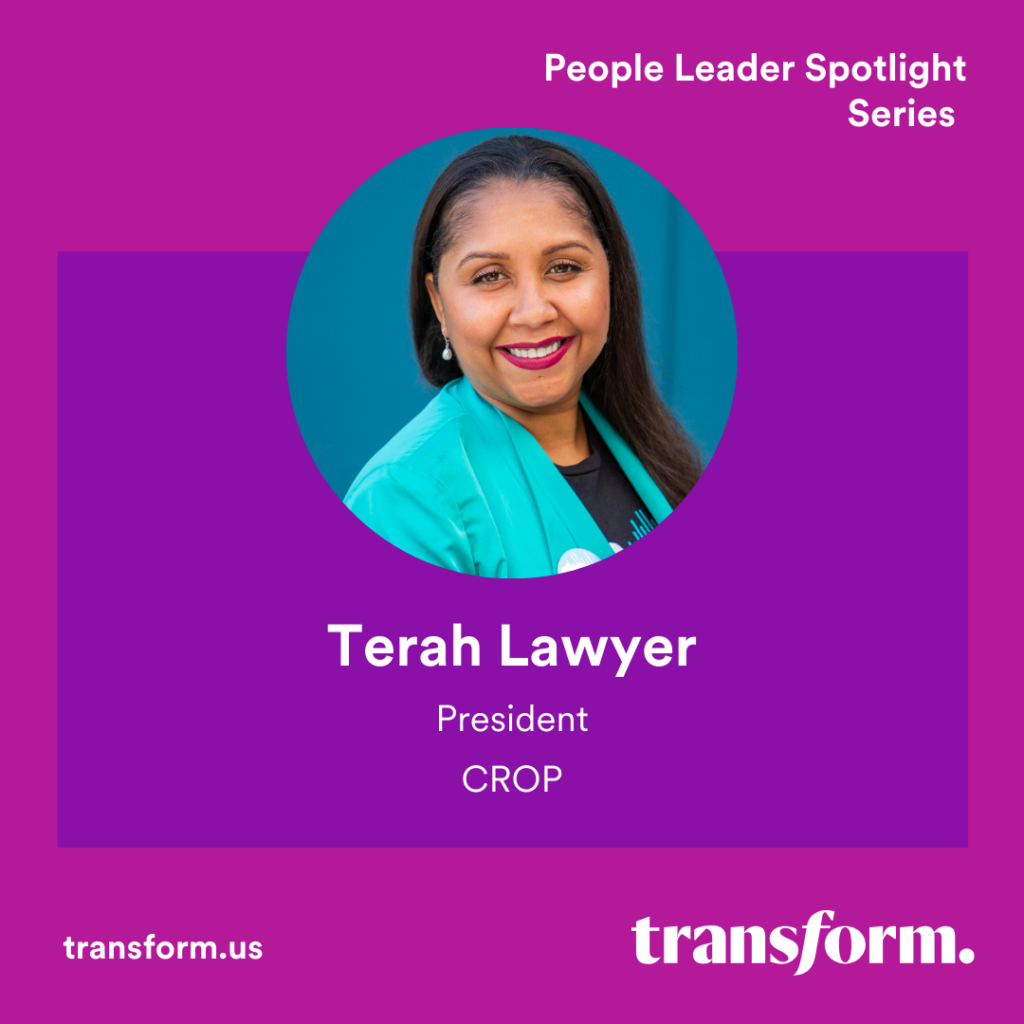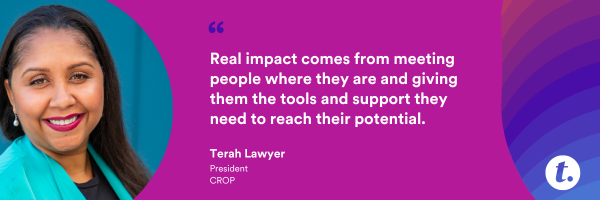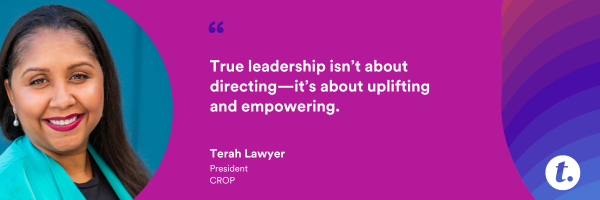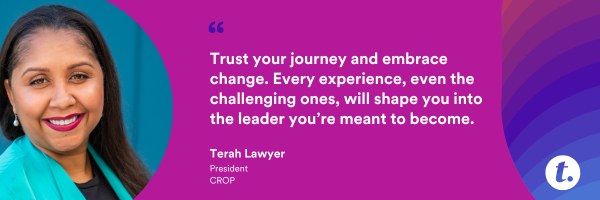
Welcome to Transform’s People-First Leader Spotlight Series, an exciting journey into the minds of innovative people leaders who are disrupting the now and next of work.
In each Q&A-style article, we’ll introduce you to people-first leaders like Terah Lawyer who are redefining the boundaries of their industries with forward-thinking ideas and transformative approaches.
About Terah
Terah Lawyer is the President of CROP (Creating Restorative Opportunities and Programs), an organization dedicated to dismantling barriers to reentry for formerly incarcerated individuals through career development, housing support, and policy advocacy. With over 15 years of experience and a deep commitment to social justice, Terah combines personal insight with strategic leadership to drive meaningful change. She has built a distinguished career creating programs that foster economic mobility, fair hiring practices, and second chances. Terah’s leadership focuses on people-first principles, resilience, and equity, and her work has been featured by major media outlets including NPR, The New York Times, and CNN.

Leadership and Influence:
Transform: Share the journey that led you to focus on people-first leadership.
Terah: My journey to people-first leadership began during my own experiences with systemic challenges, which taught me the power of empathy, advocacy, and connection. Recognizing how transformative support can be, I made it my mission to lead with compassion and to build an organization centered on empowering individuals. People-first leadership means focusing on everyone’s potential, particularly those overlooked by traditional systems, and creating an environment where everyone feels valued and supported.
Transform: Why did you choose to work in this industry?
Terah: I chose to work in reentry because I understand, both personally and professionally, the barriers that formerly incarcerated individuals face. After going through the reentry process myself, I realized how critical it is to have strong support systems that provide real opportunities. I wanted to use my experiences to shape reentry programs that truly serve people—programs built on empathy, opportunity, and the belief that everyone deserves a fair chance to rebuild and succeed. I was drawn to this field because I understand the life-changing potential of reentry support and economic opportunity for formerly incarcerated individuals. Having witnessed and experienced firsthand the struggles and triumphs of those affected by the criminal justice system, I wanted to work in an industry where I could create real pathways to success and equity, especially for those facing significant barriers.

Transform: What was your first job, and how did it shape your perspective on work?
Terah: My first job at 14 was as a cashier at Arden Farms, a catering and event venue in Newark, CA, where people gathered to celebrate weddings, birthdays, company picnics, and more. Working in this environment shaped my perspective on inclusivity and community-centered solutions. I saw how a shared space brought people from all backgrounds together, reinforcing the importance of creating environments that welcome everyone and meet diverse needs. This early experience laid the foundation for my commitment to inclusivity in my work today and underscored the power of community-oriented solutions to bring people together in meaningful ways.
Transform: How have your leadership methods evolved over the years?
Terah: My leadership has evolved to become more empathetic and adaptable. Early on, I focused on achieving specific goals, but over time, I realized that real impact comes from meeting people where they are and giving them the tools and support they need to reach their potential. My experience in reentry showed me the importance of resilience, patience, and fostering environments where people feel safe to grow and succeed. Now, my leadership centers around collaboration and understanding, creating space for others to contribute and thrive.
Vision and Impact:
Transform: What motivates you to prioritize people over processes?
Terah: My experiences in reentry taught me that processes alone don’t change lives—people do. When individuals feel seen, valued, and supported, they’re more empowered to overcome challenges and take ownership of their futures. Prioritizing people over processes means focusing on their unique journeys and helping them unlock opportunities, which is at the heart of CROP’s mission to support those who often don’t have access to resources and support.
Transform: Can you share a significant initiative you’ve led that focuses on enhancing employee well-being or engagement?
Terah: I’m proud of CROP’s employee assistance program, which includes professional development stipends, mental health resources, and tailored support for each staff member, many of whom are justice-involved. This initiative isn’t just about improving workplace engagement; it’s about creating a supportive environment that mirrors our values and gives everyone the tools they need to succeed. For many of our staff, this is the first time they’ve had access to resources like these, and it’s incredibly rewarding to see how it impacts their lives and work.
Strategies for Change:
Transform: How do you foster a culture of openness and innovation within your team or organization?
Terah: I foster a culture of openness by encouraging everyone to bring their unique perspectives and voices to the table. Our team meetings are safe spaces for sharing new ideas, giving feedback, and tackling challenges together. I also believe in celebrating creative solutions and creating growth opportunities. This approach empowers our team to take initiative and think outside the box, which is essential in the reentry space where innovative solutions are key to addressing systemic barriers.
Transform: What leadership lessons have you learned that are unique to managing people?
Terah: One of the most powerful lessons I’ve learned is that everyone’s story matters. In managing people, especially those who have faced significant challenges, it’s vital to understand each person’s unique journey. This has taught me to listen deeply and support individuals in ways that respect their experiences and personal goals. Leading authentically, with empathy and understanding, has shown me that true leadership isn’t about directing—it’s about uplifting and empowering.

Engagement and Influence:
Transform: How do you engage and inspire your team to adopt people-first practices?
Terah: I lead by example, demonstrating that every person’s experience and background is valuable. I take time to celebrate each team member’s successes, acknowledge their growth, and offer personalized support, whether through professional guidance or a listening ear. By openly embracing people-first values, I hope to show our team that prioritizing people not only drives our mission but also creates a supportive culture where everyone thrives.
Transform: Can you describe a moment when you realized the true impact of your people-first approach?
Terah: A memorable moment was when one of our staff members, who had faced challenges in reentry, shared how our support had transformed his life. He started as an intern and worked his way up to a policy associate within CROP, a journey that showed me just how much people-first leadership can impact lives. Hearing him say that our approach helped him find purpose and direction reminded me of why I lead with empathy and support.
Looking Forward:
Transform: What future trends do you believe will further shape leadership and workplace dynamics?
Terah: I believe the future of leadership will continue focusing on inclusivity, flexibility, and mental well-being. More organizations will recognize the value of skills-first hiring and the importance of creating equitable opportunities, especially for those from nontraditional backgrounds. I see a future where workplaces become even more diverse, accessible, and focused on personal and professional growth.
Transform: What’s next on your agenda for fostering a more people-centered workplace?
Terah: I’m focused on expanding CROP’s support programs to provide greater resources for our staff and participants, particularly as we grow our workforce and reentry initiatives. Additionally, I want to create more spaces for feedback and collaboration, ensuring that everyone has a voice in shaping our workplace culture.
Personal Reflections:
Transform: What is a specific project, initiative, or career highlight you are most proud of?
Terah: I’m incredibly proud of CROP’s Ready 4 Life program, which provides comprehensive support for justice-involved individuals. This program represents everything I believe in creating access, removing barriers, and empowering individuals to achieve long-term success. Seeing participants succeed in the workforce and reclaim their lives is the most rewarding part of my career.

Transform: How have you changed as a leader over the years?
Terah: I’ve become more collaborative and open to different perspectives. Early in my career, I thought leadership meant having all the answers, but my experiences taught me that empowering others and learning from each other is far more impactful. Now, I lead with a sense of humility, knowing that everyone has something valuable to contribute.
Transform: Who do you go to for advice and inspiration?
Terah: I look to mentors and colleagues who work in social justice and reentry, as well as my partner, who shares my commitment to creating change. They offer diverse perspectives and provide guidance that helps me stay grounded and aligned with our mission.
Transform: What methods do you employ to stay current on leadership and management trends?
Terah: I stay engaged through reading, attending seminars, and participating in industry forums. Learning from experts in social justice, reentry, and leadership keeps me informed and inspired to apply new strategies to our work at CROP.
Transform: How do you balance the demands of leading with personal wellbeing?
Terah: I set boundaries and make time for family, leisure time, and reflection. My experiences taught me the importance of self-care, and prioritizing it allows me to show up fully for my team and our mission.
Transform: What is one piece of advice you would offer to future leaders aiming to prioritize people in their leadership style?
Terah: Lead with empathy and remember that each person’s journey is unique. Understanding the individual experiences and needs of your team members allows you to support them authentically, which strengthens both the organization and its people.
Transform: How do you create work-life balance in your own life?
Terah: I prioritize family and personal time, carving out specific times of the day to disconnect and recharge. Staying intentional about this balance helps me maintain energy and focus for both work and life.

Transform: What career advice would you give to your younger self?
Terah: “Trust your journey and embrace change. Every experience, even the challenging ones, will shape you into the leader you’re meant to become. Focus on growth, stay open-minded, and remember that your work is making a difference.”
Connect and listen to Terah speak at Transform 2025. Save your seat now.
